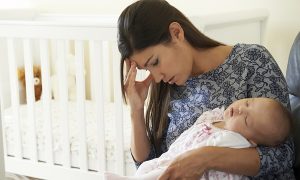Cry for Help: New Moms and Depression
Welcoming your newborn is sure to be one of the most exciting and joyful times in your life. But the experience can also prompt feelings of anxiety, fear and fatigue. If those symptoms worsen or linger after a few weeks, you could be experiencing postpartum depression, which affects up to 1 in 7 women, according to the American Psychological Association.
Feelings of depression could even begin during pregnancy, prompting the U.S. Preventive Services Task Force to recommend depression screening for all pregnant and postpartum women. “Women who already suffered from depression or anxiety before pregnancy might notice their symptoms exaggerated during the postpartum period,” explains W. Ashley Hood, DO, an osteopathic obstetrician and gynecologist in Jackson, Mississippi.
Focusing on preventive care, Doctors of Osteopathic Medicine, or DOs, look beyond your symptoms to consider how environmental and lifestyle factors impact your health. DOs also can help you mentally and physically adjust to being a new parent.
Are anxiety medications safe to take when pregnant?
Many expectant mothers assume they should discontinue their depression or anxiety medication, but Dr. Hood advises consulting with a physician to find medications that are safe to use during pregnancy. Since many anxiety medications have the potential to be harmful to a fetus, it’s best to schedule a preconception consultation to review which, if any, should be stopped during pregnancy, he says.
What is the difference between “baby blues” and postpartum depression?
Many new moms experience “baby blues” within the first two weeks following delivery. During this time, you might experience:
- Crying spells.
- Feelings of being anxious and overwhelmed.
- Uncertainty about whether you are sufficiently caring for your new baby.
- Changes in eating and sleeping habits.
- Reluctance to engage in social activities.
“Hormonal changes can wreak havoc on a woman’s body during and after pregnancy but they are not necessarily an indicator of postpartum depression. It is very common to experience mood swings, sadness and/or spontaneous crying episodes during the first six weeks after delivery–often called the baby blues,” says Octavia Cannon, DO, an osteopathic obstetrician and gynecologist.
How do you know when to seek help?
It might be time to talk to your physician about being screened for postpartum depression if you experience:
- Intense sadness or despair that affects your daily activities.
- Thoughts of hopelessness.
- Thoughts of harming yourself or the baby.
“It is important to know that asking for help with counseling or medication is not a sign of failure,” Dr. Hood says. “It’s a step toward getting well and enjoying this joyous time with your new child.”
If you had postpartum depression with your first pregnancy, does it mean you’ll have it with subsequent pregnancies?
Not necessarily, but you may be at higher risk if you experienced postpartum depression with past pregnancies.
Betsy Greenleaf, DO, an osteopathic urogynecologist, recommends early screening and intervention. “Before you give birth, your physician should screen you for factors that could increase your risk, such as history of anxiety/depression, lack of social support, domestic abuse, financial strains, unintended pregnancy and smoking/substance abuse,” she says.
How can women cope with postpartum depression?
There are many things you can do to ease the strain of postpartum depression, including:
- If you are breastfeeding, consider pumping and allowing a partner or loved one to feed the baby so you can get some rest.
- Put the baby in a car seat on the floor of the bathroom while you take a shower.
- When putting the baby down for tummy time, do some stretches or exercises next to your little one. “Exercise has been shown to increase hormones that make you feel good,” Dr. Greenleaf says.

